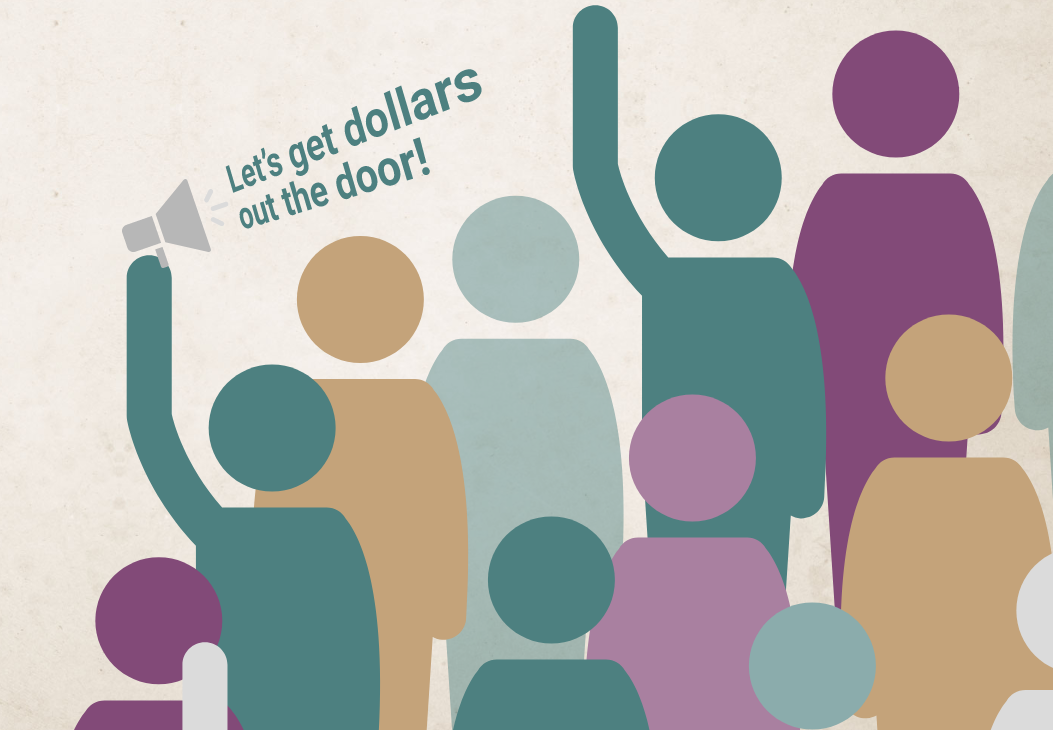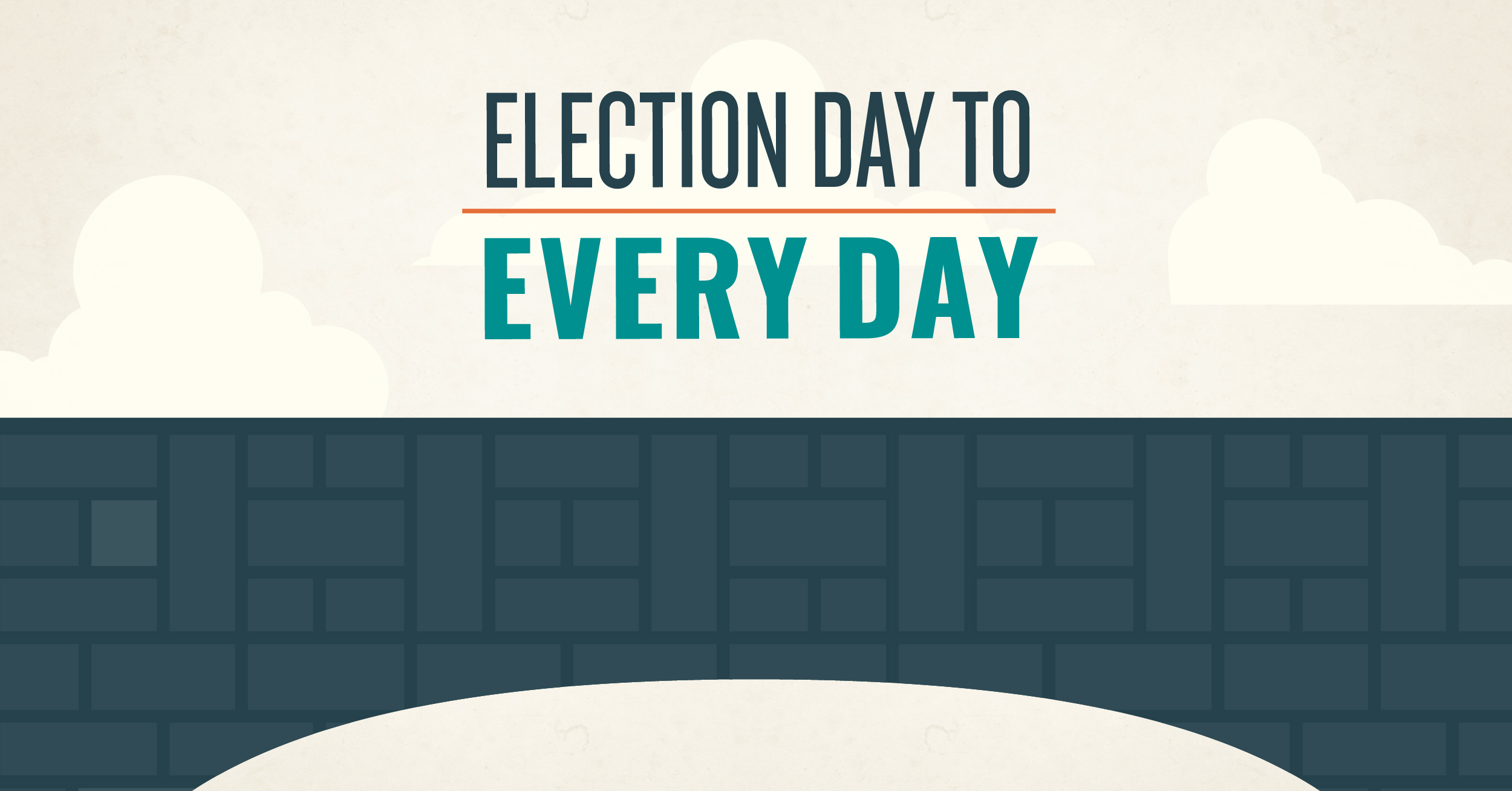Our grantees are in for the long haul. So are we.
Focus Area: Resilient Elections
Our Work is Not Done After Election Day
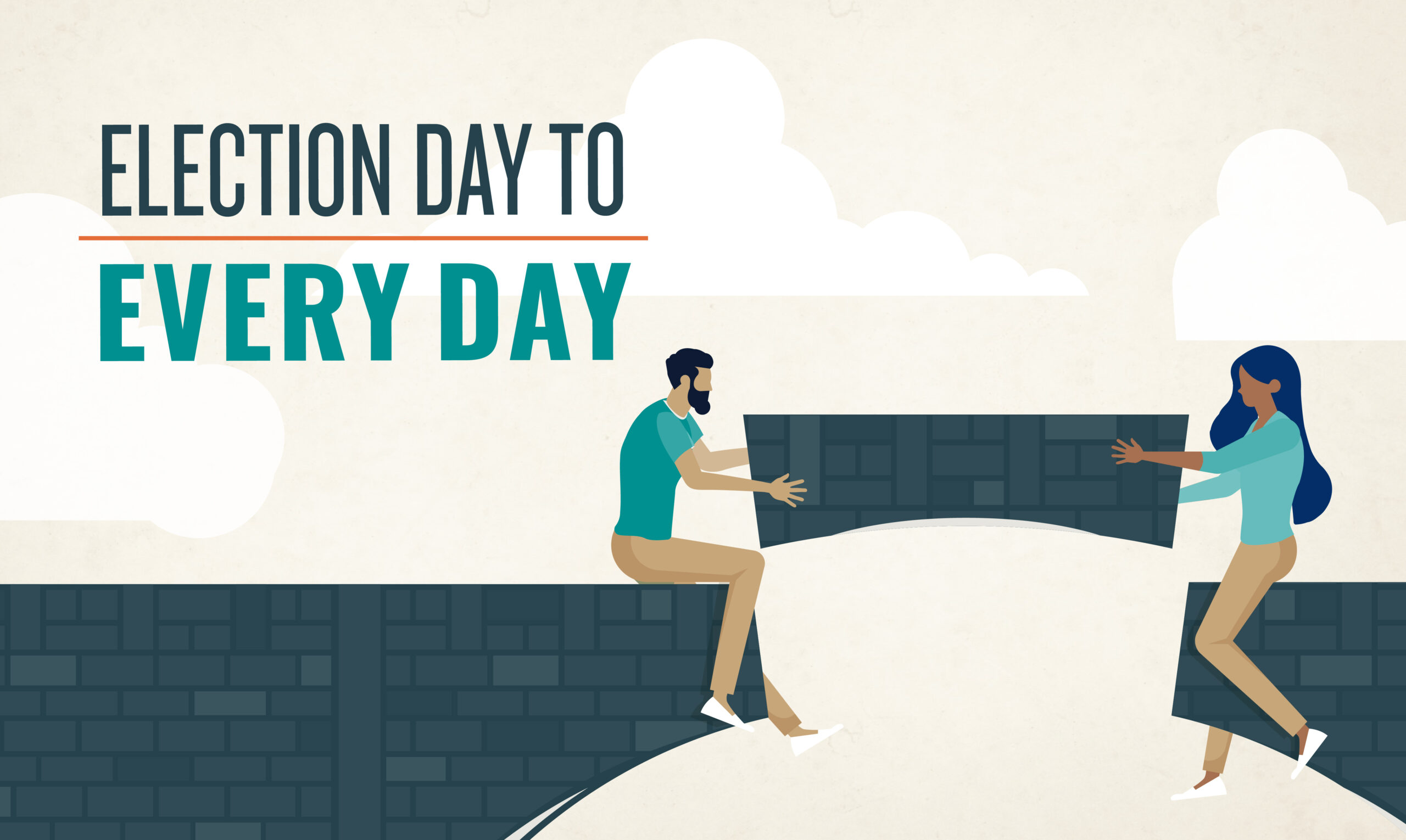
Our grantees are on the frontlines of the 2024 election, doing everything they can to ensure free, fair, and representative elections for our country. We know their work will not be done on Election Day — yet many of these nonpartisan organizations typically experience a sudden dropoff in funding after November.
This withdrawal of support threatens their ability to resist the authoritarian playbook, fuel a pro-democracy governing agenda, and build durable power to support an inclusive, multi-racial democracy. Anti-democracy forces don’t defund their infrastructure after every election cycle, forcing groups to downsize and lose momentum — and we shouldn’t either.
That’s why we’re launching a new campaign called Election Day to Every Day. Following on the success of this year’s All by April campaign, we’re inviting the philanthropic community to join us in ensuring the pro-democracy movement can be sustainable and resilient not just leading into Election Day, but every day that follows.
The boom and bust cycle of election-year giving is toxic. Unless we change our behavior as donors, our grantees will not be able to make progress toward the inclusive multiracial democracy that is so vital for everything we care about.
“People’s Action Institute is working together with networks and organizers across the country to scale up the movement for social justice. We can’t maintain the momentum we need to defeat authoritarianism when funding across the field drops off after every election. But with consistent support, we can strengthen our communities to create a vibrant, multiracial democracy that works for all of us.” – Sulma Arias, Executive Director, People’s Action Institute
With the Election Day to Every Day campaign, we are trying to do things differently. Together, philanthropy will continue our support for building an inclusive multiracial democracy. As a community, we commit to:
- Start Planning Our 2025 Giving Now: We lose vital time when we fail to plan ahead and consider alternative scenarios for the future. Donors need to consider how our changing context could impact our strategy and priorities, so that we and our grantees can respond quickly to new needs on the ground. Anti-democracy forces are well-resourced and ready for multiple governing scenarios. We need to prepare for the same. Now is the time to start planning – not next year.
- Provide a Bridge into Next Year: Many grantees come out of a hard fought election exhausted and with real gaps in funding. It’s not uncommon for leadership transitions to take place – further complicating the situation. Moving up grant decisions to the first quarter of 2025 or providing bridge funding allows grantees to avoid having to lay off staff and eases the pressure as they pivot to respond to new challenges.
- Commit to Multi-Year Support: The single most important thing that donors can do for the health of our grantees is to provide multi-year support. Doing so allows them to plan, build infrastructure, and deploy longer-range strategies. This longer-term view makes our grantees more resilient to a changing environment.
- Support Safety and Security: Grantees are facing evolving safety and security threats leading up to and following Election Day. Many are encountering cyber attacks and threats of physical violence. All of them have staff who are experiencing burn-out and trauma. If we want our grantees to sustain themselves past Election Day, we need to provide for their safety and well-being.
Individual donors, foundations, donor advisors, and other philanthropic organizations are all invited to join this critical campaign to change the culture of philanthropy. You can join by becoming an “Election Day to Every Day” signatory and by spreading the word within your networks.
Together, we can ensure the pro-democracy field is ready for the future. We came together powerfully earlier this year under the All by April banner, which mobilized at least $155 million to ensure our grantees had the resources they needed early in an important election year. Now we must keep our foot on the gas and make sure our democracy field partners know that we have their backs not just on Election Day, but Every Day.
Please feel free to reach out to us with any questions.
What We Learned from All by April
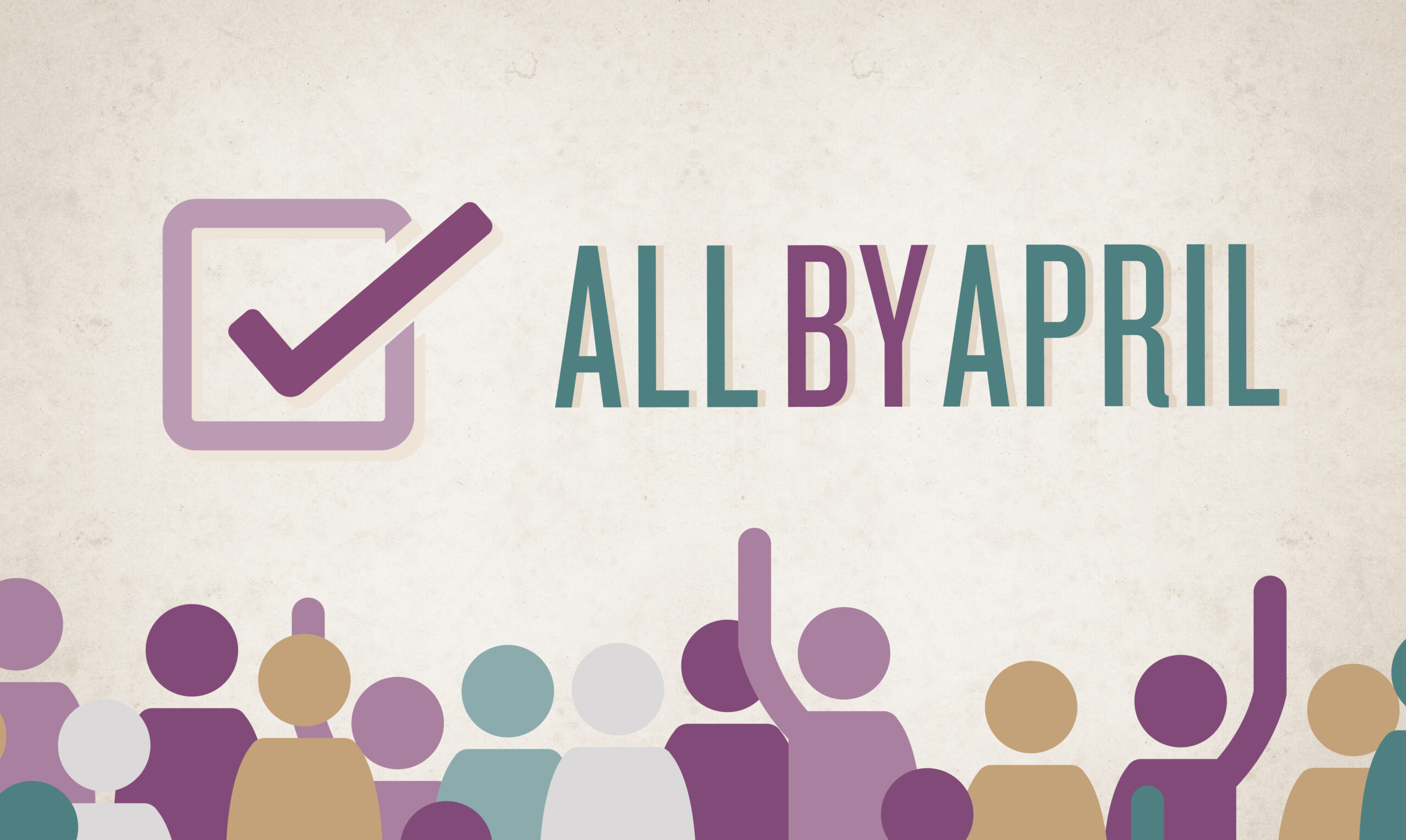
Earlier this year, Democracy Fund joined with funders from across the philanthropic community to commit to making their election-related grants by the end of April. The All by April campaign attracted 174 signers — including foundations, donor networks, advisors, and individual donors — who committed to move funds earlier in the year, simplify grant processes, and encourage their peers to do the same.
By providing early financial support, All by April aimed to empower nonpartisan, nonprofit organizations to plan and execute their election strategies more effectively, build out programs at lower costs, and engage voters earlier in the election cycle. We are proud to share the results from this campaign and outline how funders can carry forward the lessons into their ongoing election-related grantmaking.
The Success of All by April
To understand the impact of the All by April campaign, Democracy Fund collaborated with Grassroots Solutions on an evaluation. Our topline findings include:
1. The campaign mobilized at least $155 million.
Of the 174 signers of the campaign, 60 percent were direct grant makers and 40 percent were groups that work with funders like donor advisors, intermediaries, and funder affinity groups. Forty-seven of the funders and individual donors provided data on their giving between January and April of 2024. They reported making $79 million in new 501(c)(3) grants for election-related work and moving up $61 million in scheduled grant payments so that grantees would have access to funds earlier in the year. The campaign’s message also reached groups that were not able to sign onto the campaign (often due to their organization’s policy on signing public commitments). Entities that didn’t sign the campaign but reported that it still influenced their giving reported $13.7 million in new grants and $3.25 million in payments moved up to the first four months of 2024. In total, the campaign mobilized at least $155 million in election-related support.
“AbA inspired us to make additional gifts — in addition to the 2024 and multi-year funding we had already provided — and to do so before the end of April.”
— All by April Participant (Grantmaker)
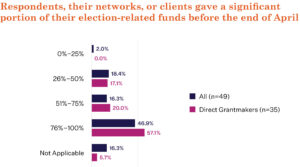
2. The majority of All by April signers reported that they changed their plans for giving in 2024 because of the campaign.
The campaign’s deadlines and structure created the motivation that moved signers to action – especially among those who were newer to election-related giving. Among direct grantmakers in the survey, 57 percent gave between 76-100 percent of their funding for elections work by April. Those who did not change their giving based on All by April reported that they had already planned to move their funds early or faced internal barriers that prevented them from doing so.
“Once we had our list of grantees, we might have spent more time obsessing over allocation amounts. Having taken the pledge helped inspire us to stop worrying and get the money moving.”
— All by April Participant (Grantmaker)
3. The campaign changed expectations about how philanthropy can support election-related work.
Nearly all of the campaign signers (98%) reported that they were already aware of the benefits of early money for election-related work before the campaign began, but they lacked the motivation and urgency to respond to the field’s need. Signers who were not direct grantmakers, but who advise donors or convene donor networks, reported that the campaign created a “movement wide” framing that gave them the language to encourage earlier giving among their clients and members.
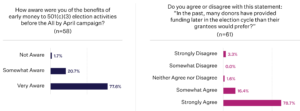
“It allowed me to have conversations with peer funders about the importance of moving early. It created a very helpful (even if somewhat artificial) deadline.”
— All by April Participant (Donor Advisor)
“We used the All by April frame to push our entire donor community for larger, earlier giving, and to make the case for c4 money also. it was helpful to have “movement wide” framing, coordination and momentum to support the work we would have done.”
— All by April participant (Philanthropic Network)
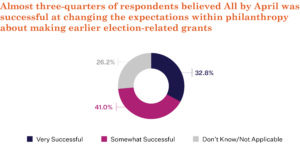
We are grateful to all of the campaign signers who committed to meet the urgent needs of the field when the funds would be most useful. We are especially grateful to the signers who participated in the evaluation and shared their funding data. This transparency allows us all to learn together and continue to improve the way we support free, fair, and representative elections.
Exploring Practices to Move Money Faster
The All by April campaign evaluation revealed that some funders need to make intentional changes to their practices to meet the needs of the field. Funders reported needing to move their timeline for considering new grants or shift other internal processes — like grant amendment requirements — in order to move up payments.
At Democracy Fund and amongst survey respondents, we noted several practices that helped funders move funds quickly:
- Streamlining the grant amendment process. Funders cut internal red tape and asked that grantees only submit an updated budget to process an amendment.
- Adopting a shorter renewal application. A shorter application helped to avoid asking grantees to send information their current funders already had.
- Starting in 2025, planning to default to making payments for election-related grants in Q1 of each year.
Funders may also consider other established time-saving practices like accepting applications that grantees have prepared for other funders or funding intermediaries who may have existing grantee relationships and can regrant money into state and local groups.
Looking Ahead: Funders Need to Sustain the Field Between Elections
Our grantees are on the frontlines of the 2024 election, doing everything they can to ensure it is free, fair, and representative. But we know their work is not over on Election Day. Anti-democracy forces don’t defund their infrastructure after every election cycle, forcing groups to downsize and lose momentum — and we shouldn’t either.
Yet many grantees see a financial cliff after November. This sudden dropoff in funding threatens their ability to resist the authoritarian playbook, fuel a governing agenda, and build durable power in service of creating a more inclusive, multi-racial democracy.
To ensure we are meeting these needs, we will be announcing a new campaign next week, called “Election Day to Every Day” to ensure our pro-democracy field is ready for any and all scenarios that lie ahead in the post-election period. We must keep our foot on the gas and make sure our field partners know that we have their backs not only on Election Day, but Every Day that follows.
Strengthening Democracy: The Crucial Role of Election Administrators
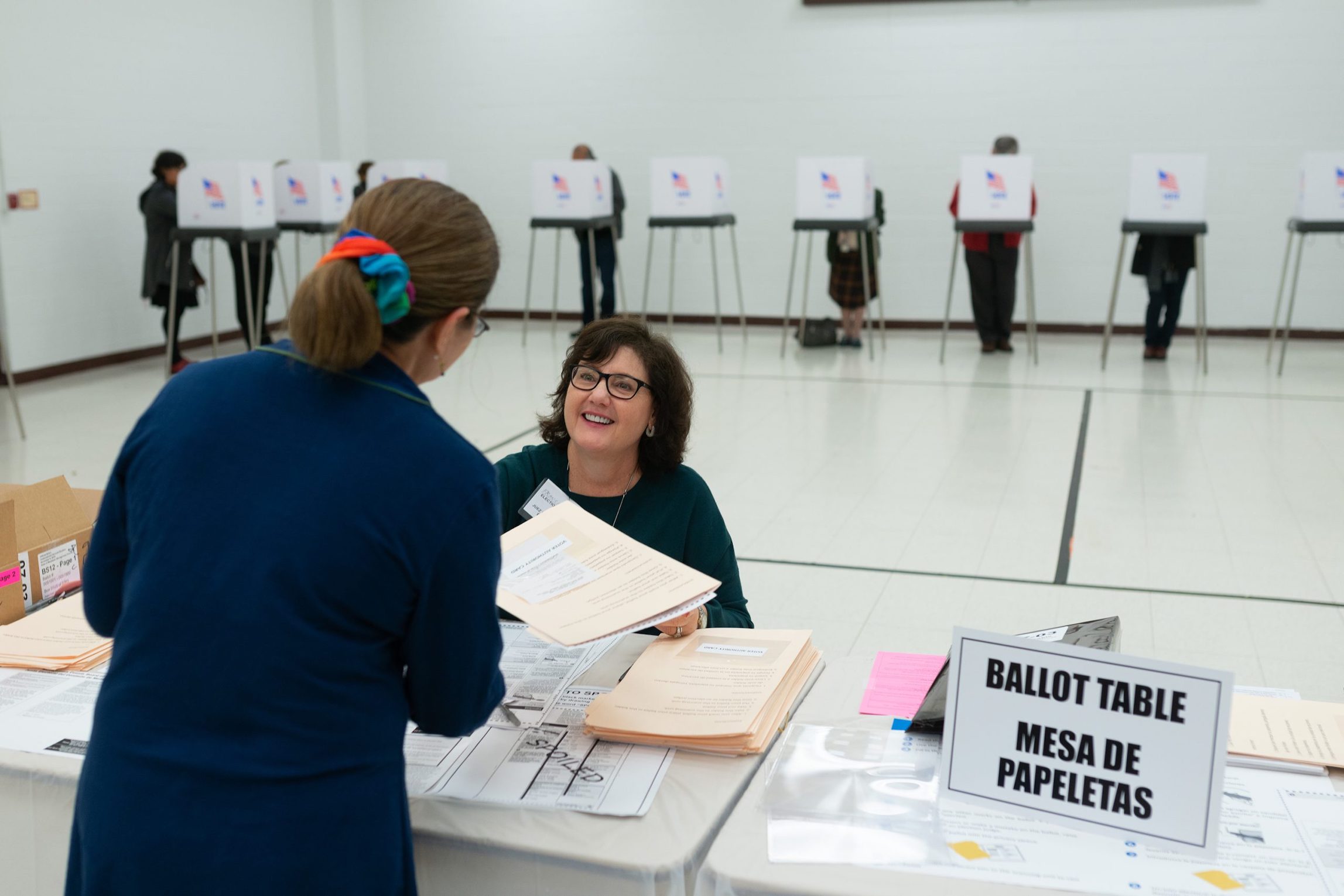
As we head into the presidential election, the pro-democracy movement must meet the moment to strengthen our democracy and ensure equitable participation, voice, and power in communities of color. This work happens on both sides of the ballot box – by increasing voter participation and by supporting election administrators who serve our diverse electorate.
On June 26, Democracy Fund hosted a webinar that focused on the trends and needs in the election administration field, featuring Amanda Litman, Executive Director and Co-Founder of Run for Something Civics and Virginia Kase Solomón, Executive Director of Common Cause Education Fund. The conversation, facilitated by Ebony West, Senior Associate at Democracy Fund, focused on the critical issues surrounding election administration in the United States, including the challenges and opportunities administrators are facing today and strategies to strengthen and diversify election administration leadership.
Since 2020, we have experienced a high level of attrition among election administrators as a result of low compensation, inadequate funding, and a hostile work environment due to growing threats against election administrators. And, despite our country becoming increasingly diverse, many election administration positions are still largely filled by older, white Americans who may be unaware of the challenges faced by marginalized communities in gaining equitable representation and access to the vote. Finally, many states have enacted restrictive voting laws, making the voting process more difficult for people of color, young people, LGBTQ+ people, and people with disabilities. However, thanks to the efforts of our panelists, their organizations, and others like them, we’re seeing inspiring progress to confront many of the challenges facing the election administration field.
One example of Run for Something Civics’ approach is exemplified in the Arizona Pima County recorder Gabriela Casarez Kelly, a member of the Tohono O’odham Nation. Kelly successfully advocated for the reinstatement of early voting sites on the Pasquay Yankee reservation, significantly increasing accessibility and voter turnout. Her journey exemplifies the real-world impact of diversity in election administration.
We also heard about the work Common Cause Education Fund is doing to increase state-level funding for election offices so they have more resources for voter education and operations. In North Carolina, Common Cause North Carolina and Democracy North Carolina successfully advocated for increased funding to the Chatham County Board of Elections so they could hire an IT Specialist. These partnerships between election administrators and advocates are key to bolstering funding for elections so that they are accessible, secure, and responsive to voters.
The field of civil society organizations supporting election officials is small, but mighty. Organizations like Center for Tech and Civic Life, Center for Civic Design, and Public Rights Project are some of the few organizations who provide training and legal support to a field that continues to face an increasing amount of challenges including our ability to carry out a safe and fair election.
While these efforts show hope of a better, more representative democracy, this important work is at risk. The chronic challenge of underfunding in election administration has now been met with new operational challenges posed by escalating security threats. Election administrators are the last line of defense against abuse of power in our government, and their work needs our support.
Our ask is simple. Philanthropy must urgently prioritize long-term investments in the backbone of how our elections are run, election administration. Our support should support the strengthening of the workforce and the systems that make the voting process equitable. Civil society and election administrators must continue to deepen the relationship with each other to ensure we work together to solve the most urgent problems for the long-term health of our democracy.
All by April: Moving Money Early for Free, Fair, & Representative Elections
